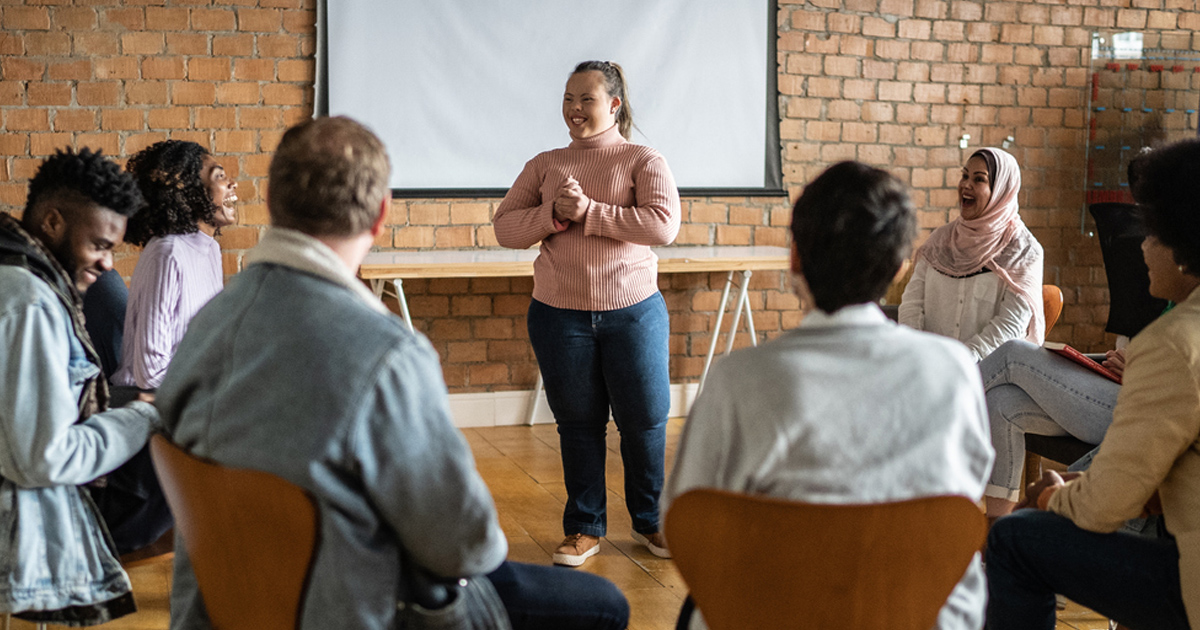Because of the disability community’s persistence in advocating for inclusion, policymakers and researchers increasingly recognize that collaborating with people who have lived experience of disability is crucial to better designed programs and policies. Excluding people with disabilities from research and decision-making related to programs and policies that serve them further marginalizes that community and often leads to incomplete or inadequate solutions to social problems.
As we commemorate this year’s National Disability Employment Awareness Month, we have reflected on how infusing the perspectives of people with lived experience of disability has enhanced our understanding and improved the quality of Mathematica research, leading to more effective policies and interventions that help people with disabilities meet their employment goals. Many of our federal partners also recognize the value of participatory research practices and discussed some of their insights in a webinar in July 2023.
“The process of including the lived experience of people in research and evaluation alone is a win.”
- Lama Hassoun Ayoub, Mathematica expert in equitable research
Together with the U.S. Department of Health and Human Services, we developed tools to support equitable evaluation in three areas: identifying, recruiting, and engaging people with lived experience. Here, we summarize best practices in each. We also describe how we have implemented these activities in our own research and the benefits of doing so in furthering our understanding of how to improve the economic well-being and independence of people with disabilities.
Identification
As the tools linked above describe in more detail, there are several key steps to equitable identification. At the start of new research, clearly define why and how you want to collaborate with people who have disabilities. With these intentions in mind, identify the perspectives you want to include and consider various identities, such as the type of disability race, ethnicity, and gender. As part of this exercise, reflect on how your own biases might affect who you engage. In addition, consider whether certain groups are underrepresented, such as people with intellectual disabilities.
The U.S. Department of Labor’s Research Support Services for Employment of Young Adults on the Autism Spectrum project demonstrates equitable identification in practice. The project examines challenges to and catalysts for improving the employment and career development outcomes of autistic young adults. To center the voices of these young adults in designing the research, Mathematica’s project team gathered community input through listening sessions to identify important research questions. In consultation with advisors who have lived experience of autism, including a senior policy advisor and technical working group members, the team identified which perspectives to include in community engagement activities, organizations from which to recruit, and the best mode of engagement. Listening sessions were designed to enable discussion driven more by participants’ priorities than the researchers’ agendas. The project team sought to include autistic young adults who are connected to advocacy organizations or services as well as young adults without these connections whose perspectives are often excluded from research. The team also identified autistic people of color, women, and nonbinary individuals, as well as those based in rural areas as important perspectives to include. Through listening sessions, the project team gained insight about key areas in which more data are needed, especially for people with intersecting marginalized identities, which the team plans to prioritize as they design an upcoming survey of young adults on the autism spectrum.
Recruitment
Best practices can also support successful recruitment. Our tools describe how to work with a variety of partners to help recruit people with diverse lived experiences and infuse their essential perspectives. Ideally, begin building a relationship before specific needs arise. Consider partnering with people in your network, community partners, and disability organizations, particularly those led by people with disabilities such as Centers for Independent Living. After you have identified partners, work with them to conduct outreach using a variety of advertising methods and mediums to ensure that your message is accessible. Plan to compensate lived experience experts at industry-standard consultant rates, but be mindful of income limits that could potentially jeopardize their eligibility status for government benefits. Also consider and inquire about other desired benefits for experts, such as professional development.
Mathematica's work on the Minority Youth and Centers for Independent Living project is an example of best practices leading to successful recruiting and community engagement. Working with advisory group members to facilitate connections and build trust in the community, Mathematica’s team generated significant interest from youth with disabilities from racial and ethnic minority backgrounds in participating in focus groups. Based on insights from the advisory and focus groups, the team learned that some youth with disabilities who could benefit from services do not identify as disabled. This knowledge will help inform future engagement efforts and emphasize the role of community-based organizations that focus on race, ethnicity, youth, or social justice as an important source for outreach and collaboration.
“I felt represented, and not only myself, but also for the people around me. So I feel confident, and I know that things are going to change after being heard.”
- Minority Youth and Centers for Independent Living participant
Engagement
A final activity that supports meaningful participation by people with lived experience is equitable engagement. As we describe in our tools, researchers should seek to incorporate meaningful involvement from people with lived experience in all stages of research and decision making. This includes designing recommendations, implementing solutions, and evaluating changes. It is important to establish a feedback loop and update experts about decisions and future actions to demonstrate the value of their support. In addition, researchers should make all engagements accessible to facilitate participation, such as offering virtual meetings options, flexible scheduling, and providing sign language interpretation and transcription options.
Mathematica project members implemented equitable engagement practices on the Rehabilitation Services Administration’s Disability Innovation Fund. Launched in 2022, the project seeks to identify best practices for moving away from subminimum wage employment for people with disabilities. As the national evaluator, Mathematica convened a technical working group that includes representatives from projects that test strategies for achieving competitive integrated employment, staff from disability advocacy organizations, and the parent of an adult child who transitioned out of subminimum wage employment. People with lived experiences and their families offer the project specific insight into the needs of people with disabilities and employment pathways. To promote accessibility, all project meetings are done in a flexible virtual format. The evaluation team continuously shares best practices to encourage competitive integrated employment with the project staff who are testing new strategies, including through practice briefs on outreach and engagement. Engaging with the technical working group improved the Mathematica team’s understanding of how the projects might affect participating groups and shaped the evaluation’s design.
"The input of individuals with disabilities and their families is necessary to improve programs and policies that serve this population. When working with this group, it is important for researchers and policymakers to listen to individuals’ experiences for the sake of listening, understand that these experiences may look different than how information is presented at the policy level, and recognize that families have competing priorities.”
– Disability Innovation Fund work group participant
Centering the lived experiences of people with disabilities in research
Our application of best practices for integrating lived experience experts into research on employment has led to authentic research partnerships that incorporate lived experience as an integral strategy to advance disability policy. By elevating the voices of people with lived experience throughout the research process, our teams reshaped research questions, tailored data collection plans, and identified processes and outputs that represented the views of the community and could ultimately lead to more culturally sensitive solutions. Expanding this practice in disability policy research will allow policymakers to better understand and account for the nuances and realities of living with a disability in a way that theory and quantitative research alone can't accomplish. This will lead to changes to policies and programs that are more likely to have their intended effect and reduce the likelihood of unintended consequences.






